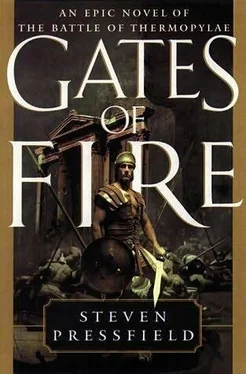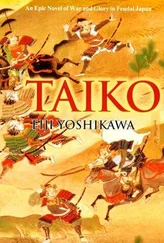Steven Pressfield - Gates of Fire - An Epic Novel of the Battle of Thermopylae
Здесь есть возможность читать онлайн «Steven Pressfield - Gates of Fire - An Epic Novel of the Battle of Thermopylae» весь текст электронной книги совершенно бесплатно (целиком полную версию без сокращений). В некоторых случаях можно слушать аудио, скачать через торрент в формате fb2 и присутствует краткое содержание. Жанр: Историческая проза, на английском языке. Описание произведения, (предисловие) а так же отзывы посетителей доступны на портале библиотеки ЛибКат.
- Название:Gates of Fire: An Epic Novel of the Battle of Thermopylae
- Автор:
- Жанр:
- Год:неизвестен
- ISBN:нет данных
- Рейтинг книги:3 / 5. Голосов: 1
-
Избранное:Добавить в избранное
- Отзывы:
-
Ваша оценка:
- 60
- 1
- 2
- 3
- 4
- 5
Gates of Fire: An Epic Novel of the Battle of Thermopylae: краткое содержание, описание и аннотация
Предлагаем к чтению аннотацию, описание, краткое содержание или предисловие (зависит от того, что написал сам автор книги «Gates of Fire: An Epic Novel of the Battle of Thermopylae»). Если вы не нашли необходимую информацию о книге — напишите в комментариях, мы постараемся отыскать её.
Gates of Fire: An Epic Novel of the Battle of Thermopylae — читать онлайн бесплатно полную книгу (весь текст) целиком
Ниже представлен текст книги, разбитый по страницам. Система сохранения места последней прочитанной страницы, позволяет с удобством читать онлайн бесплатно книгу «Gates of Fire: An Epic Novel of the Battle of Thermopylae», без необходимости каждый раз заново искать на чём Вы остановились. Поставьте закладку, и сможете в любой момент перейти на страницу, на которой закончили чтение.
Интервал:
Закладка:
Nowhere in all the field had these Spartans faltered. Now even in the hot blood aftermath their discipline maintained them chaste and noble, above all vaunting and boasting. They did not strip the bodies of the slain, as the soldiers of any other city would eagerly and gloatingly do, nor did they erect trophies of vainglory and conceit from the arms of the vanquished. Their austere thank-offering was a single cock, worth less than an obol, not because they disrespected the gods, but because they held them in awe and deemed it dishonorable to overexpress their mortal joy in this triumph that heaven had granted them.
I watched Dienekes, re-forming the ranks of his platoon, listing their losses and summoning aid for the wounded, the traumatiai. The Spartans have a term for that state of mind which must at all costs be shunned in battle. They call it katalepsis, possession, meaning that derangement of the senses that comes when terror or anger usurps dominion of the mind.
This, I realized now watching Dienekes rally and tend to his men, was the role of the officer: to prevent those under his command, at all stages of battle-before, during and after-from becoming possessed. To fire their valor when it flagged and rein in their fury when it threatened to take them out of hand. That was Dienekes' job. That was why he wore the trans verse-crested helmet of an officer.
His was not, I could see now, the heroism of an Achilles. He was not a superman who waded invulnerably into the slaughter, single-handedly slaying the foe by myriads. He was just a man doing a job. A job whose primary attribute was self-restraint and self-composure, not for his own sake, but for those whom he led by his example. A job whose objective could be boiled down to the single understatement, as he did at the Hot Gates on the morning he died, of performing the commonplace under uncommonplace conditions.
The men were collecting their tickets now. These, to which I alluded earlier, are the woodentwig bracelets tied with twine which each man makes for himself before battle, to identify his corpse if necessary in the aftermath. A man writes or scratches his name twice, once on each end of the twig, then breaks it down the middle. The blood half he ties with string around his left wrist and wears with him into battle; the wine half stays behind in a basket maintained with the tram in the rear. The halves are broken off jaggedly on purpose, so that even if the blood name were effaced or defiled in some other way, its twin would still fit in an unequivocally recognizable manner. When the battle is over, each man retrieves his ticket. Those remaining unclaimed in the basket number and identify the slain.
When the men heard their names called and came forward to take their tickets, they could not stop their limbs from quaking. All up and down the line, one beheld warriors clustering in groups of twos and threes as the terror they had managed to hold at bay throughout the battle now slipped its bonds and surged upon them, overwhelming their hearts. Clasping their comrades by the hand, they knelt, not from reverence alone, though that element was abundant, but because the strength had suddenly fled from their knees, which could no longer support them. Many wept, others shuddered violently. This was not regarded as effeminate, but termed in the Doric idiom hesma phobou, purging or fear-shedding.
Leonidas strode among the men, letting all see that their king lived and moved unwounded. The men gulped greedily their ration of strong, heavy wine and made no shame to drink water as well and plenty of it. The wine went down fast and produced no effect whatever. Some of the men tried to dress their hair, as if thereby to induce a return to normalcy. But their hands trembled so badly they could not do it. Others would chuckle knowingly at the sight, the veteran warriors who knew better than to try; it was impossible to make the limbs behave, and the frustrated groomers would chuckle back, a dark laughter from hell. When the tickets had all found their mates and been reclaimed by their owners, those pieces bereft within the basket identified the men who had been killed or were too badly wounded to come forward. These latter were claimed by brothers and friends, fathers and sons and lovers. Sometimes a man would take his own ticket, then another, and sometimes a third besides, weeping as he accepted them. Many returned to the basket, just to look in. In this way they could perceive the numbers of the lost.
This day it was twenty-eight.
His Majesty may set this number in comparison alongside the thousands slain in greater battles and perhaps judge it insignificant. But it seemed like decimation now.
There was a stir, and Leonidas emerged into view along the front of the assembled warriors.
Have you knelt? He moved down the line, not declaiming like some proud monarch seeking satisfaction from the sound of his own voice, but speaking softly like a comrade, touching each man's elbow, embracing some, placing an arm around others, speaking to each warrior man-toman, Peer-to-Peer, with no kingly condescension. Assemble, the word spread by murmur without needing to be spoken.
Does every man have the halves of his ticket? Have your hands stopped shaking enough to fit them together? He laughed and the men laughed with him. They loved him.
The victors formed up in no particular order, wounded and unwounded, plus squires and helots.
They cleared a space for the king, those in front kneeling to allow their comrades behind to see and hear, while Leonidas himself strode informally up and down the line, presenting himself so that his voice would carry and his face be seen by all.
The battle priest, Olympieus in this case, held the basket up before the king. Leonidas took out each unclaimed ticket and read the name. He offered no eulogy. No word was spoken but the name. Among the Spartans, this alone is considered the purest form of consecration.
Alkamenes. Damon. Antalkides. Lysandros. On down the list.
The bodies, already retrieved by their squires from the field, would be cleansed and oiled; prayers would be offered and sacrifices made. Each of the fallen would be shrouded in his own cloak or that of a friend and interred here upon the site, beside his mates, beneath a mound of honor. Shield, sword, spear and armor alone would be borne home by his comrades, unless the omens declared it more honorable for his corpse to be restored and interred in Lakedaemon.
Leonidas now held up his own bracelet and slid the twin halves together into place. Brothers and allies, I salute you. Gather, friends, and hear the words of my heart.
He paused for a moment, sober and solemn.
Then, when all stood silent, he spoke:
When a man seats before his eyes the bronze face of his helmet and steps off from the line of departure, he divides himself, as he divides his 'ticket,' in two parts. One part he leaves behind.
That part which takes delight in his children, which lifts his voice in the chorus, which clasps his wife to him in the sweet darkness of their bed.
That half of him, the best part, a man sets aside and leaves behind. He banishes from his heart all feelings of tenderness and mercy, all compassion and kindness, all thought or concept of the enemy as a man, a human being like himself. He marches into battle bearing only the second portion of himself, the baser measure, that half which knows slaughter and butchery and turns the blind eye to quarter. He could not fight at all if he did not do this.
The men listened, silent and solemn. Leonidas at that time was fifty-five years old. He had fought in more than two score battles, since he was twenty; wounds as ancient as thirty years stood forth, lurid upon his shoulders and calves, on his neck and across his steel-colored beard.
Then this man returns, alive, out of the slaughter. He hears his name called and comes forward to take his ticket. He reclaims that part of himself which he had earlier set aside.
Читать дальшеИнтервал:
Закладка:
Похожие книги на «Gates of Fire: An Epic Novel of the Battle of Thermopylae»
Представляем Вашему вниманию похожие книги на «Gates of Fire: An Epic Novel of the Battle of Thermopylae» списком для выбора. Мы отобрали схожую по названию и смыслу литературу в надежде предоставить читателям больше вариантов отыскать новые, интересные, ещё непрочитанные произведения.
Обсуждение, отзывы о книге «Gates of Fire: An Epic Novel of the Battle of Thermopylae» и просто собственные мнения читателей. Оставьте ваши комментарии, напишите, что Вы думаете о произведении, его смысле или главных героях. Укажите что конкретно понравилось, а что нет, и почему Вы так считаете.












